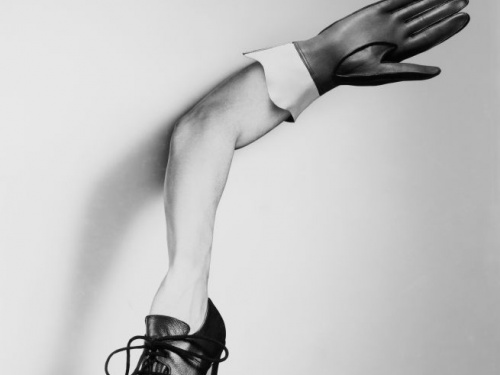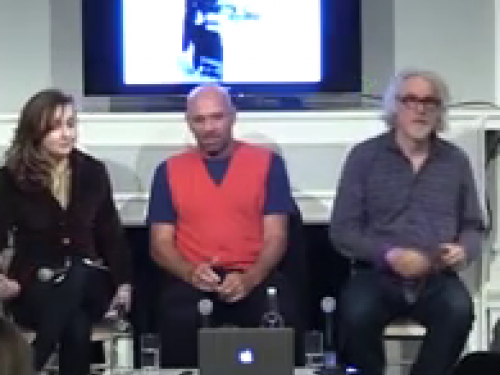Dan Hancox on Counter Culture
Ahead of our debate The Trouble With Counter Culture on Wednesday 24 July, political writer and music journalist Dan Hancox describes the role Grime music played on the streets of London during the student protests of 2010.
It was 9 December 2010, the day the tuition fees bill was passed by the House of Commons. By the Whitehall entrance to Parliament Square, young people were still clashing with riot police, trying to force their way out of the kettle. Outside the Treasury building, a mobile sound system – no more than a speaker in a trolley – pulled up, a trail of smiling young protesters following its trail of dancehall, hip-hop, R&B, pop, dance and grime. One teenager climbed on top of a dustbin to dance, ripping his shirt off despite the freezing temperatures; another did the same, facing him, 10 feet away. "It's a dance-off!" shouted some kid. Darkness fell over the Palace of Westminster, and hundreds of young people danced around these convulsing figures, silhouetted against the dark blue gloaming, lit only by burning placards, and the night lights on Big Ben.
One track stood out, its reception so raucous, so euphoric, it was rewound and played again – and again, and a fourth time. Lethal Bizzle's Pow! (Forward) is a phenomenon, a 21st-century anthem with a life of its own. The NME review on its release in 2004 captures a sense of its impact: "Once in a generation, a record comes along that causes people to sit bolt upright, a rallying cry to the masses, a barometer of social discontent that turns venues into mosh-crazed riots. In 1977, it was the Sex Pistols' God Save the Queen. In 2004, it's Lethal Bizzle's Pow! (Forward)." It's not an unfair comparison – and Malcolm McLaren would surely have loved to have seen his proteges provide the soundtrack for disaffected youth storming Her Majesty's Treasury, as they did that night in December.
It was a remarkable setting for a grime rave. Surrounded by government buildings and overlooked by statues of Nelson Mandela, Winson Churchill and Abraham Lincoln, protesters kettled in Parliament Square had little else to do but chant, smash windows, and make their own entertainment. They moshed, danced around, and threw their hands up to dancehall, American R&B and hip-hop, UK funky, dubstep and grime.
Lots of other music has cropped up as a soundtrack to the student protest movement, but none of it provoked a reaction like this soundsystem. What was extraordinary about this was the same thing that was extraordinary about the presence of thousands of under-18s on the protest: their spontaneity. No one had organised them, or expected them to protest, just as no one had programmed this playlist; instead requests were called out, the jack swapped from one teen's MP3 player to another.
For Bizzle, Pow's riotous energy is a source of great pride – especially now that energy has a physical manifestation again. "It's a beautiful thing," he says of its adoption as a protest anthem. "It just shows the power." He pretends to address David Cameron: "Who's really got the power? You've got thousands of people running around, destroying London – and you're meant to be the prime minister." Bizzle has previous with Cameron, which may explain why he keeps addressing him directly. In 2006, as leader of the opposition, Cameron addressed Radio 1's playing of hip-hop and grime with the kind of nuanced understanding of art we've come to expect from Conservative MPs: "Do you realise that some of the stuff you play on Saturday nights encourages people to carry guns and knives?" Cameron said. Bizzle responded in a Guardian article memorably headlined "David Cameron is a donut", and the spat continued in a Cameron-penned piece in the Mail on Sunday which accused the MC of "talking rubbish".
"Don't dismiss us," Bizzle says, echoing the message of his "donut" piece. "We've got more power than you have on the youth. You're a millionaire guy in a suit, your life is good – you can't relate. These kids can relate to people like myself, Wiley, Dizzee, Tinie Tempah, Tinchy: we're from the council estates, we lived in these places where they live, we know what it's like. We're the real prime ministers of this country."The relationship between grime and the mainstream could scarcely be more different in 2011 – and nor could the recording of Pow 2011, a forthcoming reworking with a whole different selection of grime all-stars: "When I made the first one," Bizzle says, "I made one phone call, and everyone came to the studio the next day. They had fuck-all else to do." Owing to tour, media and studio commitments, tracking down the MCs for Pow 2011 (including Wiley, Chipmunk, P Money, Kano, and JME) took a little longer.
It would have been completely unthinkable as recently as two years ago, but the Radio 1 playlist this week features singles by five different grime MCs – four on the priority A-list. Meanwhile, Dizzee, Tinie Tempah, Chipmunk, Roll Deep and Tinchy Stryder have scored 11 No 1 singles between them since 2009. And yet those hits are a million miles from the delirious rebel energy of Pow!
"They have to compromise to move forwards," Bizzle admits, "but it's not really the artists' fault. Grime is still a genre the corporates don't understand, and don't have any control over. And that's the most important thing in their world: control." The other thing that's held back that raucous energy, he says, is its banishment from London clubs. "When we first started to create this thing, it was about going along to clubs, people singing along to the songs, going crazy to the beats – seeing girls skanking out to hard, bouncy, grimey beats. But the whole dance and enjoyment side, the club side, just got taken away."
The operative word there is "taken". The same Metropolitan Police force kettling the kids in Parliament Square were responsible for the use and misuse of Form 696, a piece of paperwork described as "draconian" and "absurd" by John Whittingdale, the Tory MP tasked with looking into it – he recommended it be scrapped in 2009, but by then it was too late. It had been used to target black music nights in London ("Is there a particular ethnic group attending?" asked one question on the form), shutting down grime raves before they even happened, and snuffing out the genre as physical, dynamic club music. "The music just became YouTubey, iPody, in-your-house listening, rather than for the club," Bizzle says, ruefully. "This sound, this whole grime thing, is supposed to be dance music."
A couple of days after we meet, I send the YouTube video of the kids dancing to Pow! in Parliament Square to Bizzle. He calls back immediately: "Fucking hell, I got goosebumps watching that. When you're on stage it's a different kind of feeling, but that video, with nothing pre-arranged, just seeing it from the outside looking in, you're actually seeing how they really feel about your music. Singing along word for word, rewinding it – it's inspirational. We don't even realise how powerful we are."
He sounds like he's picked up on some of the anger of the videos of the protests, too. "It's a big 'fuck you' to those sods as well, and to the cuts. David Cameron is still a donut. I told him six years ago what's going on, and he tried to neglect it. Now it's on his front doorstep. He should really be scared. I've got more power than he has, when it comes to those kids: they're singing my song in his front garden."
Back in 2006, explaining his unexpected attack on grime and hip-hop, Cameron said he was trying to set an example, that he wanted more people to have "the courage to speak up when you see something that is wrong", despite the fact that this would "get a lots of bricks thrown at you". Maybe the grime kids were listening to him after all.
Extracted from an article originally published in the Guardian on 3 February 2011.
This article is posted in: Articles, Blog
Tagged with: Counter Culture, Dan Hancox, Grime, London





